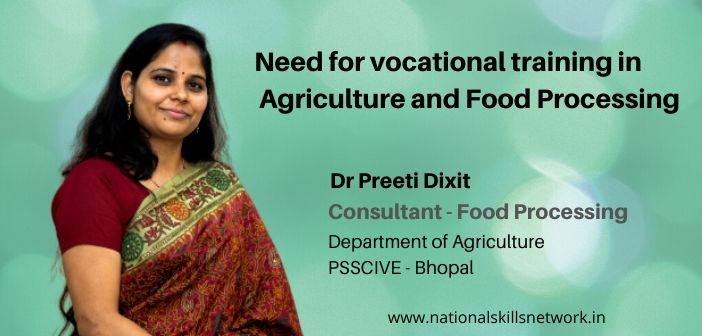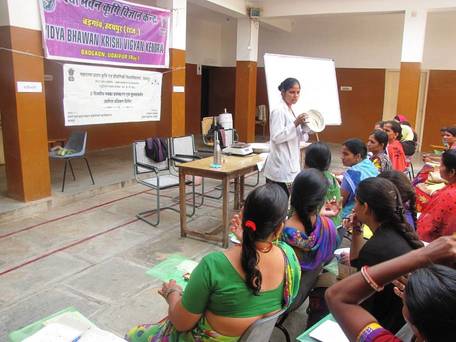With an objective to introduce subject experts working behind the scenes for curriculum development for skill-based course, we spoke to Dr. Preeti Dixit, Consultant -Agriculture and Food Processing, Department of Agriculture at PSSCIVE, Bhopal. She is responsible for planning, designing and drafting curriculum for NSQF compliant courses in Agriculture and Food processing. Here’s the Skill Talk, to tell you more about incorporating agriculture related courses at the school level and the scope for skilled women to become entrepreneurs in the field.
Q: How did you get interested in Agriculture, Agricultural Technology, and Food Processing?
A: Coming from a rural family background, I have seen that agriculture is one of the most honest and toughest jobs. But at the same time, the farmers rarely get enough income from what they have invested because of many factors. I have also seen that due to lack of knowledge, skills and market awareness among the farmers, the middlemen get benefitted. Slowly, this made me realize that we definitely need to have a proper system so that the farming produce reaches the market or the food processing industry directly from the farmer, skipping the middlemen, so that a farmers can get their real share.
It triggered my interest in learning the value chain of agriculture, involving a set of actors and related activities whether technological or food processing to bring a basic agricultural crop from farm to fork. I started learning about the relationship between agriculture, food processing and nutrition and how all the three are interrelated and can drastically impact each other. Better agriculture produce cannot ensure better nutrition until it is utilized and processed thoughtfully and through scientific food processing.
Q: What are your views on school-level agriculture programs with a focus on food processing?
A: I feel that agriculture being the backbone of Indian economy and contributing a major share of GDP, has not received its due credit at the school level education system. Agricultural programs specially related to food processing have been overlooked until now. Vocational education and training in this particular area has suffered a great set back. The transition from old mindset of kheti khalihan to corporate farming and FDI in agriculture has necessitated a rethinking of agriculture and food processing education in school level programs. But yes, in recent years the efforts have been made under the scheme of vocationalization of Secondary and Higher Secondary Education, which have introduced various job roles in agriculture and food processing sector.
However, I feel there is a need to introduce more job roles with a focus on food processing sectors, which can connect the farmers to the industry and customers directly. The Skill India mission incorporating food processing based agricultural programs at the school level education will prepare the students for enormous career opportunities in the agricultural and food processing sector on one side and prepare a skilled workforce having professional expertise to deal with the challenges faced by the farmers on the other side.
Related articles: Check out the notes from the PSSCIVE UNESCO-UNEVOC TVET Conference. Read more: https://nationalskillsnetwork.in/psscive-unesco-unevoc-tvet-conference-2020/
 Q: How are you using your research in the consultancy service you provide?
Q: How are you using your research in the consultancy service you provide?
A: My research involved both lab and land experimentation and has given me the opportunity to test my laboratory intervention with the real world and people. I was exploring the real-life experiences and have learned that adoption of technology from lab to land implies great efforts and sometime you have to rethink and reinvent your technology according to the needs of society. The more people I speak to and the more I read, I become aware of how critical the issues of the farmers, small scale entrepreneurs, young people and especially rural women. I also realized that linking agriculture with food processing and training the farmers to process their own crops and then sell it as a value-added food product can be a key element in income generation as well as employability.
 Considering the above facts in my mind, I have provided training to more than six hundred (600) people (the group of farm women, farmers, tribes, entrepreneurs, SHG workers, ICDS workers, Scientists, subject matter specialist, and youth) on how to process and add nutritional value to their crops and food products through various institutions of Rajasthan, Gujarat and Madhya Pradesh. I continuously strive, research and think what can be the best possible alternatives to prepare skilled workforce for the food processing sector.
Considering the above facts in my mind, I have provided training to more than six hundred (600) people (the group of farm women, farmers, tribes, entrepreneurs, SHG workers, ICDS workers, Scientists, subject matter specialist, and youth) on how to process and add nutritional value to their crops and food products through various institutions of Rajasthan, Gujarat and Madhya Pradesh. I continuously strive, research and think what can be the best possible alternatives to prepare skilled workforce for the food processing sector.
Q: What is your role in the curriculum development of courses at PSSCIVE?
A: The Pandit Sundarlal Sharma Central Institute of Vocational Education (PSSCIVE – a constituent unit of the National Council of Educational Research and Training (NCERT) and also a UNEVOC Network Centre) is an apex research and development organization in the field of vocational education. Bestowed with the responsibility to work on vocational education, the Institute has made tremendous efforts in this direction. Working as the Consultant for Food Processing in the Department of Agriculture, I am responsible for planning, preparing, designing, drafting, implementing, evaluating, revising, improving and finally developing the learning outcome-based curriculum in the field of food processing under the guidance of the core faculty.
Recently curriculums of two job roles “Baking Technician” and “Craft Baker” have been published by the institute and uploaded on the website. Identification of the representatives from the academia and industry to evaluate the drafted curricula in terms of its relevance to the needs of the industry and stakeholders, its quality, contribution to the professional development of the student and skilling of the workforce is also included in my job role.
Huge prospects are emerging in the Agro-food processing sectors like organic farming, vermicomposting, bakery, fruits and vegetable processing, ready-to-eat and ready-to-cook segments in India. Women being an integral part of the Indian agricultural workforce and their inbuilt futuristic outlook and creativity can definitely change the way of skilling the workforce around the world. Skilling woman is indeed a small but definitely a change-maker towards skilling the Nation.
Q: What is the scope for skilled women to become entrepreneurs in the agriculture sector and food processing?
A: Well, you will be proud to know that India ranks first, globally, in the production of pulses, beans, milk, fruits and vegetables, and second in the production of wheat, sugarcane, rice, and potato. But the sad part of the story is that, though India is a major food producer, its share in the world food trade is less than 2%. Only 6-8% of the food items produced in the country are processed in contrast to the developed nations where 60% to 80% of the food items are processed. This can be considered as a huge window of opportunity for skilled women. The agriculture and food sector in India employ about 44% of the workforce, of which the majority do not have any formal or informal skill training. The availability of skilled manpower has been identified as one of the major challenges, which creates a lot of opportunities for skilled women to become entrepreneurs in the agriculture sector and the food processing sector.













Well articulated
Very Nice, keep the good work going!! All the best
Very informative !
Way to go Dr. Preeti Dixit 👍
Is this vocational training is open to all.Where this training is given.How days training it is.Is any amount is required to take this course.If required how much.What type of knowledge would be achieved from this training.I want to learn in detail regarding its advantages.
Fantastic & progressive work. Keep on doing work how to enhance our organic food from agricultural Sector & double income of farmer which have beneficial both for biodiversity as well as human beings ? I Think agricultural is a profession of hope. Best luck for our progressive job….!
I have gone through the content attached. I think Dr. Priti have captured the details very well as per the market requirements to develop the core competency and skills. According to me this content is good to go.
I have gone through the content attached. I think you have captured the details very well as per the market requirements to develop the core competency and skills.
According to me this content is good to go.
Nice program. It will promotes the farmers n mainly it is available to farmers who are in rural area, they are following only old customs . I think it may change the peoples thinking towards progress in farming.
Great work. Continue your good work in the field of food processing and agriculture. This will uplift the status of farmers in India.
Written very well and expressed beautifully. This is definately good sign to see that women like you are concerned and doing great work. Keep going Dr. Preeti
Good job. Keep on doing good work in the field of vocational training and development.